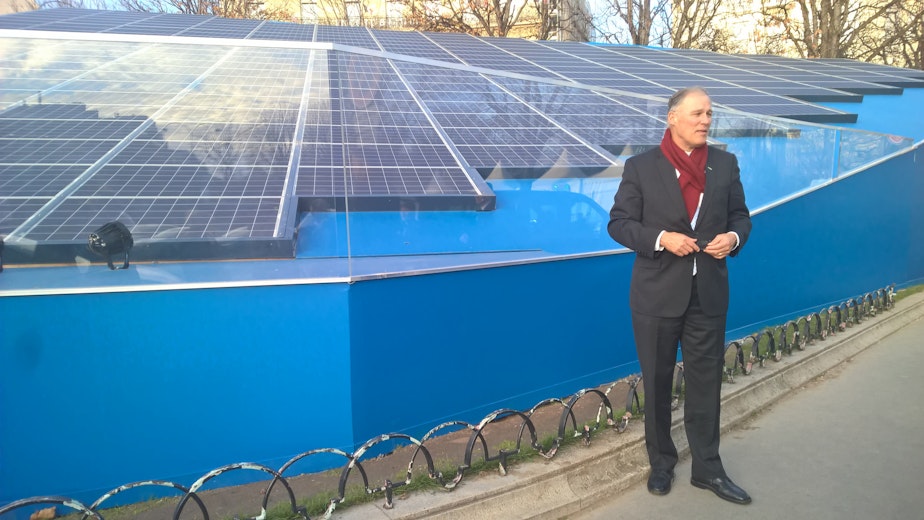Why Gov. Inslee Is Joining The Climate Party In Paris

The Paris climate talks have shifted the spotlight to a group of international leaders dubbed “sub-nationals” -- but one of those leaders from the Pacific Northwest prefers a different title.
“We’re ‘super-nationals,’” Washington Gov. Jay Inslee joked, referring to the governors, mayors, provincial premiers and others who are working on carbon-reduction policies at local levels.
Inslee’s comment came during a panel Monday with California Gov. Jerry Brown and the mayors of Vancouver, B.C. and Oakland, California.
Eighty sub-national leaders from around the world have signed on to a goal of limiting warming to below 2 degrees Celsius (3.6 degrees Fahrenheit) and limiting greenhouse gas emissions to two tons per capita. Inslee signed on in May.
Sponsored
While in Paris, Inslee announced a more tangible new initiative: a mandate that at least 20 percent of all new passenger vehicles in the state’s fleet will run on electricity by 2017. That’s up from the current 1 percent for the state fleet of approximately 12,000 light-duty vehicles.
Statewide, more than 3 out of every 1,000 registered vehicles in the state are electric.
Washington isn't on target to meet its statutory carbon-reduction limits, adopted in 2008. That could change, however, under new carbon-reduction rules Inslee has called for. The rules are expected to be out by late December.
The rules will set caps on the amount of carbon allowed to be emitted within the state and require emissions reductions from the 40 or so companies that emit more than 100,000 metric tons of carbon dioxide each year. The caps will be specifically tailored to each company, which will then have the option of purchasing offsets through approved providers.
Inslee’s new carbon-reduction rules should not be confused with a cap-and-trade system, said Stu Clark, program manager for the carbon rule at the Washington state Department of Ecology.
Sponsored
“We’re not establishing a market, not managing any credits, setting any credit prices,” he said. “We’re not generating any revenue through this program, because we can’t legally do that.”
“This rule says you’ve got to get this many tons of emissions reductions, but you can pretty much do that however you want,” Clark said. The state will require third-party verification of the proposed emissions reductions strategies but it will not oversee the market, as is the case with California’s cap-and-trade system.
Companies will also have a broader selection of possible options for offsetting their emissions if they can’t meet their reductions targets by changing their operations.
“You can initiate projects somewhere out there that reduce emissions that have nothing to do with your business model. It could be electrifying vehicles. It could be capturing dairy methane waste and turning it into power. It could be energy efficiency programs or renewable energy,” Clark said.
The rule lays the groundwork for Washington state to join other climate initiatives, such asCalifornia’s cap-and-trade program and the Regional Greenhouse Gas Initiative in the Northeast.
Sponsored
Power utilities like Avista and Puget Sound Energy will be among the Washington business operations affected by the rule, as will large pulp and paper mills, cement companies and oil refineries. However, the refineries will only be regulated for the fuel they produce for in-state use. Watercraft and airplane fuel will not be regulated under the new rule.
The operations targeted by the rules account for 60 percent of the state’s greenhouse gas emissions. Critics say Inslee is unfairly targeting the manufacturing and industrial sectors.
“It hurts families and he’s overstepping I’d say, and a bit tone deaf to the working families of Washington who are dependent on these manufacturing jobs,” Sen. Doug Ericksen, R-Ferndale, said in an interview.
Ericksen went on to say that the point of international climate talks is a “worldwide socialist wealth redistribution system to tax the rich countries to give to the poor countries” and that Inslee should have “Skyped in” and saved the carbon emissions of flying to Paris.
On a media call from Paris, Inslee responded to criticism from Republicans.
Sponsored
“I wish we had help from that side of the aisle to fashion a response . That hasn’t happened. It’s unfortunate because conservative leaders from around the world are participating in these talks,” Inslee said. “This has been an inspirational group that I’ve been talking to these last couple of days.”
The Washington Department of Ecology new rules will be subject to public input before a final version is adopted. That’s expected to happen by mid-2016.
Copyright 2015 ERTHFX. To see more, visit http://earthfix.info/.
